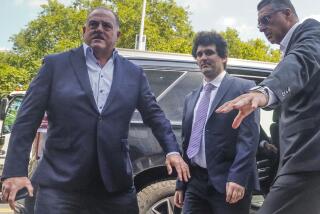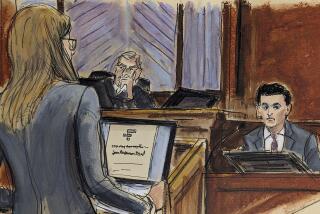Testimony Shines Light on Bid Laden’s Terror Strategy
- Share via
NEW YORK — A once-trusted aide of Islamic extremist Osama bin Laden provided a jury on Tuesday the most direct and intimate portrait publicly available of the Saudi militant’s terror network designed to drive Americans from the Middle East.
The former aide said Bin Laden was enraged when U.S. forces led the Persian Gulf War against Iraq in 1991 and when it later sent troops into Somalia in 1993. According to the testimony, Bin Laden called America “the snake” and declared, “We have to cut the head off and stop them.”
Jamal Ahmed Al-Fadl, whose identity had been kept secret until he appeared in court, was the first witness called in the trial of four Bin Laden followers charged with killing 224 people in bomb attacks on two U.S. embassies in East Africa in 1998. Al-Fadl has been in the federal witness protection program since breaking with Bin Laden before the bombings. U.S. District Judge Leonard B. Sand warned court artists not to sketch Al-Fadl’s face.
Federal prosecutors allege that the embassy bombings were the work of the network Bin Laden set up to kill U.S. citizens and bring down pro-Western governments.
During more than five hours of testimony in heavily accented English, he took jurors inside the Bin Laden organization, on a tour ranging from training camps in Afghanistan, where recruits learned to use weapons and explosives, to a sprawling guest house in Sudan where plots against American interests were hatched.
Al-Fadl said he was present, for example, at meetings soon after the Soviet Union was driven from Afghanistan at which Bin Laden created the organization called al-Qaeda (the Base).
“He said, ‘We want to change our governments,’ ” Al-Fadl recalled.
When the U.S.-Iraq conflict erupted in 1991, Al-Fadl said he attended a meeting in a three-story guest house al-Qaeda owned in Khartoum, the capital of Sudan.
The sentiment of the group was simple, the witness said: “We can’t let the American Army stay in the Gulf area and get our oil and our money. We have to fight them. We have to take them out.”
Al-Fadl told the jury he was born in Sudan in 1963, traveled to the United States on a student visa in 1986 and lived in Brooklyn, Atlanta and North Carolina. He said he first met Bin Laden at a guest house in Afghanistan after receiving weapon training in preparation for fighting Soviet troops on the Afghan front.
Al-Fadl said he again met Bin Laden in 1989 as the war was winding down and the Islamic militant told him he was thinking about creating al-Qaeda because “everything’s over in Afghanistan.”
Al-Fadl said he was a very early member of al-Qaeda. Dissecting the terrorist organization, he provided a unique glimpse of its anatomy.
Al-Fadl said al-Qaeda was composed of several committees: a Shura Council that set overall policy, a Committee for the Military Purpose that bought weapons and conducted training, a Fatwa Committee that issued Islamic decrees, a Newspaper Committee that published a weekly newspaper, and a Money and Business Committee that handled investments and established front companies.
Training ranged from how to fire light weapons, use rocket-propelled grenades and how best to blow up buildings. Recruits also were told how to behave at airports when approaching customs.
Al-Fadl said the military committee issued false passports and tickets.
He recalled once during a trip to Egypt that he was instructed to shave his beard to avoid suspicion, wear Western dress, leave his books about jihad at home, take cigarettes and bring cologne.
“It’s good for women, so you look like you are interested in women,” he said.
“They tell you when customs opens your bag, be nice and smile. Don’t carry anything that attracts attention. Just say, ‘I come for a visit.’ Nothing to do with Islam,” Al-Fadl added.
As he spoke, the witness painted a portrait of al-Qaeda both as a sophisticated and a somewhat tribal organization, with some members working on farms.
Al-Fadl said al-Qaeda moved from Afghanistan to Sudan in the early 1990s, where Bin Laden bought real estate and farms to grow crops and train terrorists. Al-Qaeda operated several businesses, including a construction company and an investment firm specializing in foreign exchange transactions. The companies, which were replicated in other countries, served to generate income, provide fronts and disguise paramilitary training.
The group also had political clout at the highest levels, the witness told the jury. He said Sudan’s president, Lt. Gen. Omar Hassan Ahmed Bashir, issued a letter waiving customs dues for goods al-Qaeda brought into the country.
Sudan’s intelligence service cooperated with al-Qaeda’s operatives to screen out spies seeking to infiltrate the terrorist organization.
“We are afraid someone come and take information and give it to another country,” Al-Fadl told the jury in halting English.
The witness said two spies were imprisoned and one was executed.
He said Bin Laden liked to deal in cash. Al-Fadl said that in preparation for the move to Sudan, al-Qaeda’s money and business committee gave him $180,000 to buy a salt farm near the Red Sea, where explosives training later took place.
And he said the Saudi multimillionaire was frugal, if not stingy. Al-Fadl said he was paid $500 a month in cash. Others, he said, received sugar, tea and food as wages.
He said he once asked for a raise but was turned down.
Bin Laden occupied a spacious room in a big house in Khartoum with a frontyard and backyard, and members of al-Qaeda would gather at the house for prayers, lectures and strategy sessions.
“Sometimes we would take dinner together,” Al-Fadl recalled. “Bin Laden had an office in a big room on the second floor.”
He told Assistant U.S. Atty. Patrick J. Fitzgerald he met with Bin Laden “a lot--more than 10” times in Sudan.
The prosecutor asked about the sacrifices members of al-Qaeda must make if drafted by the group to fight a holy war.
“Your family, your kids, your money, your business,” Al-Fadl said. “You have to give everything.”
Al-Fadl said Bin Laden’s organization had conducted training with Hezbollah, the powerful Shiite Muslim group, and provided weapons to jihad, or holy war, organizations in Egypt.
He said the countries where al-Qaeda has branches include Algeria, Libya, Egypt, Syria and the breakaway Russian republic of Chechnya.
The witness, who wore dungarees, a white shirt with stripes and a skullcap, gave the names of scores of Bin Laden associates in staccato speech--words and spellings so fast they tested the mettle of court stenographers.
At one point, Al-Fadl identified Wadih El-Hage, who sat at the defense table in the courtroom. Prosecutors charge he worked as Bin Laden’s personal secretary.
El-Hage faces life in prison without parole, as does co-defendant Mohamed Sadeek Odeh, if found guilty in the embassy bombings.
Two other defendants, Khalfan Khamis Mohamed and Mohamed Rashed Daoud al-’Owhali, could face the death penalty.
Bin Laden, who was indicted in connection with the embassy bombings that killed 12 Americans and injured more than 4,500 people, remains a fugitive, believed to be under the protection of the Taliban regime in Afghanistan.
The U.S. government has offered a $5-million reward for his capture.
*
Times staff writer William C. Rempel contributed to this story.
More to Read
Sign up for Essential California
The most important California stories and recommendations in your inbox every morning.
You may occasionally receive promotional content from the Los Angeles Times.













